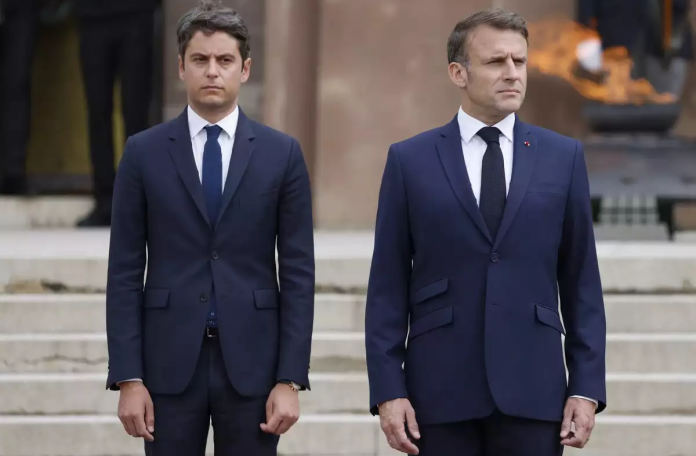French President Emmanuel Macron refused to accept the resignation of Prime Minister Gabriel Attal, according to AP News.
Macron asked him on Monday to stay on temporarily as head of government after chaotic election results left the government in limbo.
Voters split the legislature into leftist, centrist, and national-oriented parties, leaving no faction even close to the majority needed to form a government. The results of Sunday’s vote raised the risk of paralysing the European Union’s second-largest economy.
The president bet that his decision to call snap elections would give France a “moment of clarification.” However, the result proved otherwise, less than three weeks before the start of the Paris Olympics, when the country could be at the centre of the international spotlight.
The French stock market fell after the open and then quickly recovered, possibly because markets feared a complete victory for a national-oriented or left-wing coalition.
Prime Minister Gabriel Attal stated he would stay in office if necessary, but resigned Monday morning. Macron, who appointed him just seven months ago, immediately asked him to stay on “to ensure the stability of the country.”
Newly elected and returning lawmakers gathered in the National Assembly on Monday to begin talks in earnest about a new government. Macron himself is travelling to a NATO summit in Washington midweek.
Negotiations over who should form the new government and who should head the foreign, interior, and finance ministries, among others, are expected to be extremely difficult and lengthy, according to Jean-Didier Berger, a newly elected lawmaker from the conservative Republicans party.
We are in a situation that is totally unprecedented.
Challenges in forming government
Aurélien Rousseau, recently elected MP for the New Popular Front and a former minister in Macron’s government, recognised the divisions within the left-wing alliance over the formation of the government.
We need to build compromises, but we need to take time to discuss, to know what we agree on or disagree within the left.
Another New Popular Front MP, Jérôme Guedj of the French Socialists party, said the left-wing alliance would not succumb to pressure to name its candidate for the next prime minister, who could rule alongside Macron.
This is a confusing moment (and) we’re not going to add anxiety, unnecessary division at a moment when we need to find the right path.
According to official results released Monday morning, all three major blocs fell far short of the 289 seats needed to control the 577-seat National Assembly, the most powerful of France’s two legislative chambers.
The results showed the leftist New Popular Front coalition winning just over 180 seats, taking the top spot and ahead of Macron’s centrist alliance with more than 160 seats. At the same time, the national-oriented part of the National Rally of Marine Le Pen and its allies received third place.
Risk to French economy
The New Popular Front’s leaders immediately pushed Macron to give them the first chance to form a government and propose a prime ministerial candidacy. The faction promises to reject many of Macron’s major reforms, embark on a costly public spending programme and take a tougher stance on Israel’s war in Gaza.
However, Macron warns that the left’s economic programme could prove disastrous for France, which has already been criticised by EU observers for its debt.
Le Pen, who was expected to run for president of France for a fourth time in 2027, said the election laid the groundwork for “the victory of tomorrow.”
Unlike other countries in Europe that are more accustomed to coalition government, France has no tradition of lawmakers from rival political camps coming together to form a majority. France is also more centralised than many other European countries.
